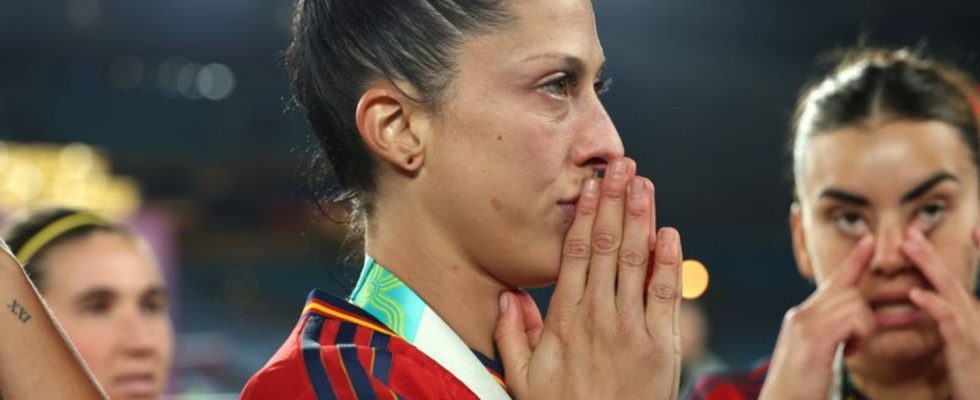After the kissing scandal
Chaos surrounding Spain’s world champions
After the kissing scandal, Jennifer Hermoso criticizes the Spanish association. photo
© Isabel Infantes/Press Association/dpa
Jenni Hermoso accuses the Spanish Football Association of a strategy of division. Some of the striking world champions are bowing to pressure from officials. But can a team like that win?
In the kissing scandal surrounding the association president, who has since resigned Luis Rubiales, Spanish women’s football is sinking deeper and deeper into chaos.
World champion Jennifer Hermoso accused the national association RFEF of “division” and “manipulation” “in order to intimidate us and threaten us with legal consequences and economic sanctions,” as she wrote on the X portal (formerly Twitter). Now at least eleven of the fifteen nominated world champions bowed to pressure from the Royal Spanish Football Association RFEF and joined the national team.
The association had threatened severe fines and long-term bans. When asked by journalists whether she was satisfied with her nomination, world champion Misa Rodríguez replied curtly: “No.” World footballer Alexia Putellas, who also gave in to the pressure, answered “Bad” when asked at Barcelona airport how she felt.
Ice Age in Spain
It’s been ice age since the association called up the striking footballers for the upcoming international matches against their will. Rubiales kissed Hermoso on the mouth without being asked at the award ceremony after Spain’s final triumph over England in Sydney on August 20th, triggering huge outrage around the world. He further asserts that the kiss immediately after the World Cup victory was mutually agreed upon. Hermoso vehemently contradicts this.
“We have spent weeks, months looking for this protection that we could not find in the RFEF itself. The same people who ask us for trust are the ones who today publish a list of players who have asked “Not to be appointed,” criticized Hermoso.
However, the government also put pressure on the footballers: “If the players don’t compete, I’m sorry, the government has to act and enforce the law,” said Víctor Francos to the radio station El Larguero.
Francos is the president of the highest Spanish sports authority CSD, he announced talks and an attempt at mediation. If this fails, there will be even greater trouble. According to Spanish sports law, refusing to compete despite being nominated is a particularly serious offense that can result in fines of between 3,000 and 30,000 euros and bans of between 2 and 15 years.
Nations League game in Sweden
The new coach Montse Tomé, who is considered Rubiales’ confidant, traveled with the six world champions who appeared at a hotel in Madrid to the small town of Oliva in Valencia on the Mediterranean coast. The association had ordered other players nominated by Tomé the day before there. According to the RFEF, the players should start training there and fly to Sweden on Thursday, where they are scheduled to play in the Nations League against the Scandinavians on Friday at 6:30 p.m.
Spain wants to qualify for the 2024 Olympics in Paris through this away game and a home game against Switzerland next Tuesday. It was questionable whether that could work with such an angry team. On Monday, Tomé nominated 15 world champions, although they had previously announced that they did not want to be nominated as long as there were no fundamental changes in the association. The criticism is based on paternalism and abusive behavior by men.
Tomé assured journalists in Madrid that she had spoken to the footballers she had nominated and that none of them had refused to take part in the matches. The players around Putellas saw things completely differently. Late on Monday evening they announced that they would continue their international strike. Hermoso had not been appointed by Tomé. The trainer said the reasons were that they wanted to “protect” Hermoso. In her statement on
Shortly before midnight, Aitana Bonmatí, who was named the best World Cup player, wrote on X, among other things: “(…) our firm will not to be nominated for legitimate reasons (…) remains fully valid.” Hermoso wrote that she stood by her teammates.
Through their international match strike, the footballers wanted to keep the pressure on the association high. 21 members of the world champion squad and 18 other top players called, among other things, for the removal of RFEF interim boss Pedro Rocha and other officials close to Rubiales.
The association issued a communiqué on the occasion of the squad nomination and emphasized: “We guarantee the players a safe environment and are committed to a climate of mutual trust in order to work together to ensure that women’s football develops even stronger in the future.”

